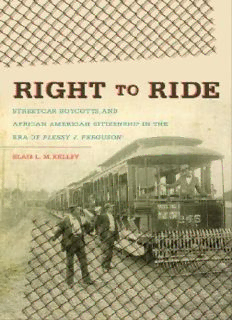
Right to Ride: Streetcar Boycotts and African American Citizenship in the Era of Plessy v. Ferguson (The John Hope Franklin Series in African American History and Culture) PDF
Preview Right to Ride: Streetcar Boycotts and African American Citizenship in the Era of Plessy v. Ferguson (The John Hope Franklin Series in African American History and Culture)
RIGHT TO RIDE THE JOHN HOPE FRANKLIN SERIES IN AFRICAN AMERICAN HISTORY AND CULTURE Waldo E. Martin Jr. and Patricia Sullivan, editors RIGHT TO RIDE STREETCAR BOYCOTTS AND AFRICAN AMERICAN CITIZENSHIP IN THE ERA OF PLESSY V. FERGUSON Blair L. M. Kelley The University of North Carolina Press Chapel Hill ∫ 2010 The University of North Carolina Press All rights reserved. Designed by Courtney Leigh Baker and set in Merlo and Serifa by Keystone Typesetting, Inc. Manufactured in the United States of America. The paper in this book meets the guidelines for permanence and durability of the Committee on Pro- duction Guidelines for Book Longevity of the Council on Library Resources. The Univer- sity of North Carolina Press has been a member of the Green Press Initiative since 2003. Library of Congress Cataloging-in-Publication Data Kelley, Blair Murphy, 1973– Right to ride : streetcar boycotts and African American citizenship in the era of Plessy v. Ferguson / Blair L. M. Kelley. — 1st ed. p. cm. — (John Hope Franklin series in African American history and culture) Includes bibliographical references and index. isbn 978-0-8078-3354-4 (cloth : alk. paper) — isbn 978-0-8078-7101-0 (pbk. : alk. paper) 1. African Americans—Civil rights—History. 2. Civil rights movements—United States—History. 3. Segregation in transportation—United States—History. 4. Boycotts—United States—History. 5. United States—Race relations— History. 6. New Orleans (La.)—Race relations—History. 7. Richmond (Va.)— Race relations—History. 8. Savannah (Ga.)—Race relations—History. i. Title. e185.61.k355 2010 323.1196%073—dc22 2009050000 cloth 14 13 12 11 10 5 4 3 2 1 paper 14 13 12 11 10 5 4 3 2 1 FOR JULIA This page intentionally left blank CONTENTS Acknowledgments ix Introduction 1 1 new york 15 The Antebellum Roots of Segregation and Dissent 2 the color line and the ladies’ car 33 Segregation on Southern Rails before Plessy 3 our people, our problem? 51 Plessy and the Divided New Orleans 4 where are our friends? 87 Crumbling Alliances and New Orleans Streetcar Boycott 5 who’s to blame? 117 Maggie Lena Walker, John Mitchell Jr., and the Great Class Debate 6 negroes everywhere are walking 139 Work, Women, and the Richmond Streetcar Boycott 7 battling jim crow’s buzzards 165 Betrayal and the Savannah Streetcar Boycott 8 bend with unabated protest 195 On the Meaning of Failure Notes 201 Bibliography 233 Index 247 A section of illustrations appears after p. 115. ACKNOWLEDGMENTS Acknowledgments are a moment when an author is able to acknowledge that most of what often felt like a very solitary enterprise is actually the result of thousands of pages read by friends, mentors, and colleagues and hundreds of moments of kindness and critique, arguments and heart-felt conversations. I was nervous about writing my own, worried about accu- rately sharing my gratitude with those who have helped along the way. It is my hope that these few pages will begin to express the debt that I owe to so many people who believed in my e√orts. Throughout this project I have received research support. I am grateful to the institutions that provided financial support, including the Duke Endowment Fellowship; the Anne Firor Scott Award from Women’s Stud- ies at Duke University; the University of Notre Dame’s Erskine Peters Dis- sertation Year Fellowship; a fellowship from the National Endowment of the Humanities, which designated Right to Ride a We the People project; and research funding from the College of Humanities and Social Sciences at North Carolina State University. I owe a debt of gratitude to many of my colleagues in the Department of History at North Carolina State University for their support. In particular, I thank Gail O’Brien for her close reading of the manuscript early in the process. I am especially thankful to the commu- nity of scholars who participated in the National Endowment for the Hu- manities Institute on African American Civil Rights Struggles in the Twen- tieth Century, hosted by the Department of African and African American Studies at Harvard University in the summer of 2006.
